70 Unveiling the Escalating Crisis and Understanding Awami League Supporters Navigate the Storm in Bangladesh
ts22zv
Introduction
Sheikh Mujibur Rahman created the Awami League in 1949, and it has been a crucial influence in creating Bangladesh’s political landscape ever since. The party, which began as a manifestation of Bengali nationalism in then-East Pakistan, played a critical role in the establishment of Bangladesh as an independent country in 1971. Sheikh Hasina, Sheikh Mujibur Rahman’s daughter, emerged as a major campaigner for democracy upon her return to Bangladesh in 1981. Despite obstacles, including a temporary loss in the 1991 elections, the Awami League restored political power in 2009 and 2014. As Bangladesh prepares for elections, the political scene is characterized by heightened tensions and massive protests, which have been driven in part by the opposition’s demand for Prime Minister Sheikh Hasina’s resignation. Despite unwavering online support evidenced by political fandom on social media, Awami League supporters face real-world problems, including disruptions due to regular strikes and political turmoil, creating a complex dynamic. With the growth of disillusioned anti-fandom among certain groups of the party’s followers, this discrepancy highlights the complicated nature of political engagement. Internationally, the attention from the US and the EU emphasizes the crucial need of securing free and fair elections, indicating the broader ramifications of Bangladesh’s political evolution. The persistent issues have resulted in a noticeable shift in public attitude, with an increasing number of people voicing dissatisfaction with the government’s developmental efforts, adding layers of complexity to the country’s evolving political environment. This paper will delve into Bangladesh’s changing political scene as international criticism, particularly from the United States and other countries, focuses on electoral problems. In this context, the narrative among Awami League supporters is altering, impacted by continued strikes, the arrest of opposition leaders and sympathizers, and the engagement of garment workers in strikes, adding layers of complication to the country’s political dynamics.
Evaluating the Awami League’s Long Political Influence and Current Power
Sheikh Mujibur Rahman created the Awami League in 1949 as the epitome of Bengali nationalism in what was then East Pakistan. The party, which advocated for political autonomy for the eastern area, was instrumental in transforming East Pakistan into the independent republic of Bangladesh in 1971. Following the proclamation of independence, Sheikh Mujib, who had recently been freed from prison, became the country’s first prime minister in January 1972, under the newly formed parliamentary administration. Sheikh Hasina, Sheikh Mujibur Rahman’s daughter, returned to Bangladesh in 1981 and quickly established herself as a prominent and vocal campaigner for democracy. After being elected as the leader of the opposition in parliament, she vehemently criticized the crimes committed during military rule and launched efforts to protect basic human rights for all citizens. Sheikh Hasina failed to secure a majority in parliament in the first free general election held in Bangladesh in 16 years in 1991, resulting in the transfer of power to her opponent, Khaleda Zia, the head of the rival Bangladesh Nationalist Party (BNP). Despite this setback, Sheikh Hasina persisted, and her political career took a stunning turn. With victories in the 2009 and 2014 elections, the Awami League reclaimed political power. Notably, 154 of the 300 parliamentary seats went uncontested in the 2014 election, with Awami League candidates declared ‘victors’ on 127 of these uncontested seats (MASTOOR et al., 2016).The government that arose as a result of these wins remains in power to this day.
Despite Current Election Tensions how Awami League’s Supporters Still in Favor of them: Political Fandom
Bangladesh’s Election Commission has announced that parliamentary elections will be held on January 7, following fatal rallies by opposition parties demanding the prime minister’s resignation.”The 12th parliamentary election will be held on January 7 in 300 seats,” stated Chief Election Commissioner Habibul Awal in a live television broadcast on Wednesday, asking parties to hold negotiations to address the political turmoil. The main opposition Bangladesh Nationalist Party (BNP), whose top leaders are either imprisoned or in exile, has already stated that if Awami league’s leader does not quit and hand over power to a non-partisan caretaker administration to monitor the general election, the party will boycott the polls. Hasina has been the leader of Bangladesh for the past 15 years and is accused of dominating with an iron grip (Jazeera, 2023). Following fifteen years of direct or thinly veiled military control, electoral democracy has returned, but the recent turn has given a heavy blow to democratic hopes. If the opposition boycott continues, she is widely expected to return to power for the fourth time ( Riaz et al., 2014)
- United States, the European Union, and their allies are looking into this year’s election
To make sure that everything is being fair in the elections this time the United States, the European Union, and their allies insist on free, fair, and inclusive voting, warning Dhaka and Awami League government against a recurrence of previous elections’ alleged manipulation, intimidation, and boycotts by major parties. With worries growing and time running out, the United States imposed visa restrictions on September 22 on “individuals responsible for, or complicit in, undermining the democratic election process in Bangladesh.” Certain members of law enforcement, the ruling party, and the political opposition – as well as their immediate families – may now be ruled ineligible to enter the United States, according to Matthew Miller, a State Department official (Writer, 2023). This has resulted in Awami league’s supporters to come in support and sharing about how because of this Government Bangladesh has come far along and this Government to continue to lead the country.
E.g-

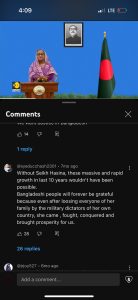
This can be categorized under Political fandom. Political fandom is a significant example of a new pattern of political engagement. Fans frequently attend entertainment or sports events as a group to support celebrities or athletes, which is referred to as “fandom”. Similarly, a group of people who are fans of particular political personalities might organize a fandom to support their favorite politicians by engaging in political communication and actions as a group (Lee & Moon et al., 2021). Awami League has an official Facebook page as well as Youtube channel hence, they can be accessed just like any celebrities and over the years Sheik Hasina herself has become a brand name for Awami league. Due to this reason supporters mainly talk either on Youtube or Facebook hence I focused on Youtube. With the statement above it can be understood Awami league’s leader has a supportive fanbase even with the ongoing tension among parties they continue to support her throughout everything which can be an example of Political Fandom.
Due to Current Elections Tension Day to Day Life of the Supporters are Getting Affected: Anti Fandom and Political Fandom
- Ongoing strike in all over Bangladesh
On July 28th, the BNP scheduled a sit-in protest at all Dhaka entrances, and members of the ruling Awami League party joined them. On Saturday, police battled with members of Bangladesh’s major opposition party, which claimed that many of its activists were hurt during anti-government protests in Dhaka. The Bangladesh Nationalist Party (BNP), led by former Prime Minister Khaleda Zia, sought Prime Minister Sheikh Hasina’s resignation and the formation of a non-party caretaker administration until the next general election, which is scheduled for early January.The BNP and its allies accuse Hasina of vote tampering in 2018, and the party has been protesting who should preside over the next general election (Jazeera, 2023a). Due to this continuous strikes which are still taking place has been hampering day to day life of citizens as well as the supporters. During 2013 before the election the same occurrence happened and a case study was conducted on the strikes. Strikes had no positive effects on certain groups of people. Because of these blockades, the entire educational system collapses. Aside from that, merchants are essentially day laborers, and many of them live in poverty. As a result, it will be better for the country’s economy if politicians refrain from calling strikes and blockades. Political strikes that resulted in blockades have caused economic uncertainty about the future of residents and the country itself (Alvi et al., 2020). This has enraged the general citizens as well the supporters.
E.g-
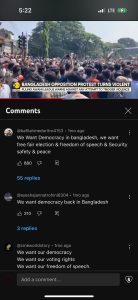
This entire issue is tied to the Process View of Politics, which is more concerned with how people experience politics in their daily lives. As due to this continuous strikes all citizens are getting affected as well as the supporters of Awami League who are in favor of them due to rising issues a part of them are becoming Disappointed Anti-Fandom as they are fans of the party as a whole while yet being critical of some sections of it.
- Railway blockade by oppositional party
Due to political feud between the parties Bangladesh Nationalist Party (BNP) and Awami League the ongoing countrywide road-rail-waterway blockade imposed by the main opposition BNP and its allies has disrupted supply chains and increased transportation costs significantly because only a fraction of trucks and buses have been on the road during the shutdown. “Just a few days ago, I had to pay 15,000 Bangladeshi takas ($136) for a truck to transport vegetables from the countryside to my Dhaka shop.” “It’s now 22,000 takas ($200) because very few truck owners allow their vehicles to ferry goods,” Uddin explained. This comes on the heels of the country’s already high inflation, he noted. “If we don’t raise the prices again, we’ll lose money.” But if we do, we’ll have unsold, rotten vegetables,” Uddin lamented (Mahmud, 2023). Due to having two major political parties, citizens support either. This has cost a lot of problems in the country and still is, till this date. Even though this has been mostly done by the oppositional party this still is happening due to the elections where the already existing government is not getting involved in this which is affecting the general public as 70% of the citizens are in favor of this government yet this situation is affecting the entire nation (Molla, 2023) .
E.g-

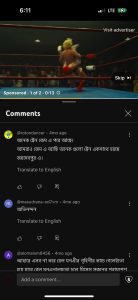
Translation 2nd pic- “we have been stuck for the entire day because of this situation the government should do something about it”.
This shows how the public is not happy as well as supporters as the majority supports Awami League. It also falls under the Process View of Politics is primarily concerned with how people interact with politics in their daily lives. As a result of the constant problems arising due to political reasons, all citizens are affected, as are followers of the Awami League who are in support of them. And as the majority of the citizens are in support of the current Government they are Disappointed Anti-Fandom, due to this situation even if they are supporting the party as a whole they are being critical of specific portions of it.
- Oppositional leaders and supporters in Jail
Hundreds of BNP leaders were detained in the days preceding up to the demonstration. On the day, as hundreds of thousands of supporters flocked to the streets, activists from Hasina’s Awami League were seen attacking the rallies armed with sticks, iron rods, machetes, and other weapons, escorted by police. The violence claimed the lives of at least three persons, including a BNP activist, a police officer, and a journalist. The few BNP leaders who escaped arrest are now hiding out. Habibun Nabi Khan Sohel, the BNP’s joint secretary general, currently faces over 450 charges and is one of 170 leaders accused of violence and death following the October 28 riots. He had been hiding for the previous week. Sohel stated how the last few months of his life had been defined by endless politically driven charges being filed against him, forcing him in and out of the courts and consuming his life from a hidden location. In the run-up to the 2018 elections, he faced a similar predicament (Ellis-Petersen & Rahman, 2023). The citizens are divided into two groups saying these BNP leaders and supporters are guilty and others saying they have been framed.
E.g-
–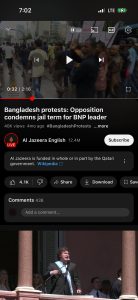
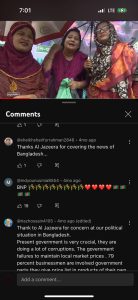
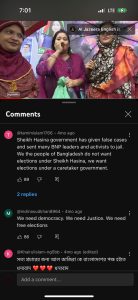
Here one part of the group is thanking Al- Jazeera for covering this news and the other is saying it is fake. This can be tied to The Arena View of politics that investigates the politicking that occurs in the traditional ‘arenas’ where power is fought through elections, representative bodies, political parties, and interest groups. This may happen due to the “fan” strongly identifying with the party and using motivated reasoning to dismiss inconsistencies and defend continued identity. The “good citizen” character, on the other hand, is performed when civic obligation rules are prominent. A decent citizen revises his or her party identification to align with his or her political views (Harton et al., 2014).
- Bangladesh Garment worker strike
The 4.4 million workers in Bangladesh’s ready-made garment (RMG) sector are requesting a tripling of their legally mandated minimum salary from 8,000 Bangladeshi Taka (BDT), or roughly $72, to 23,000 taka ($208). Taking advantage of the unrest, the country’s main opposition, the Bangladesh Nationalists Party (BNP), declared a two-day general strike on November 19, demanding the resignation of the Awami League-ruled government and the holding of general elections under a caretaker government. Bangladesh’s Election Commission set January 7 as the date for elections next year, but all opposition parties have rejected it. The PM’s future will be determined by how well she handles worker issues, domestic RMG sector demands, and ensuring big brands keep their commitments on procurement standards. Ms. Hasina must do so while also attempting to control inflation and the precipitous decline in foreign exchange reserves (Shankar, 2023b). This situation has enraged the general public and they are asking for betterment.
E.g-

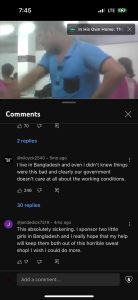
Clearly the supporters are not happy with everything that has been going on recently. This can be tied with Disappointed Anti- Fandom as people are genuinely disheartened with the current situation of the government.
According to a survey conducted by the Republican Party of the United States, 53 percent of Bangladeshis believe the country is heading in the wrong direction, while 44 percent say it is heading in the right path. However, the survey indicated that 70% of Bangladeshis approve of Sheikh Hasina’s work as prime minister. The opposition’s approval rating has risen from 36% in September 2019 to 63% in the most recent poll . Even though the general public was happy with the development that happened in the last decade the supporters are not becoming more Disappointed Anti- Fandom because of the situation that has the country come to in current years (Shankar, 2023).
Conclusion
In conclusion, Bangladesh is at a critical moment as it approaches the next elections, with the political scene clouded by tensions, protests, and calls for the Prime Minister’s resignation. The Awami League’s ongoing support, particularly in political fandom on social media, comes with the concrete hardships encountered by its followers as a result of strikes and instability. This complex relationship emphasizes the multifaceted nature of political engagement, with disappointed anti-fandom growing among some supporters. The international community’s careful monitoring emphasizes the worldwide importance of free and fair elections. As the continuous issues cause a shift in public mood, an increasing number of people express dissatisfaction with the government’s development initiatives, notwithstanding past approval. The shifting narrative complicates Bangladesh’s political environment, emphasizing the importance of gaining a thorough understanding of the various causes creating public opinion and influencing political processes in the country. In order for the Awami League to maintain their supporters and prosper they have to see what the citizens want and start enforcing those into actions effective immediately.
References
Alvi, A. M., Tasneem, N., Hasan, A., & Akther, S. B. (2020b). Impacts of blockades and strikes in Dhaka: a survey. International Journal of Innovative Business Strategies, 6(1), 369–377. https://doi.org/10.20533/ijibs.2046.3626.2020.0048
Lee, S., & Moon, W. (2021b). New public segmentation for political public relations using political fandom: Understanding relationships between individual politicians and fans. Public Relations Review, 47(4), 102084. https://doi.org/10.1016/j.pubrev.2021.102084
Harton, H. C., & Tweten, C. (2014). Loyal Fans or Rational Good Citizens? Motivated Social Cognition and Political Party Identification. PsycCRITIQUES, 59(26), 5-. http://resolver.scholarsportal.info/resolve/15540138/v59i0026/5_lforgcscappi.xml
Riaz, A. (2014). BANGLADESH’S FAILED ELECTION. Journal of Democracy, 25(2), 119-130. Retrieved from https://proxy.library.brocku.ca/login?url=https://www.proquest.com/scholarly-journals/bangladeshs-failed-election/docview/1530409928/se-2
MASTOOR, M. (2016). AWAMI LEAGUE’S POLITICS OF VENGEANCE: Vol. Vol xxxv No. 8. Spotlight on Reginal Affairs. https://d1wqtxts1xzle7.cloudfront.net/56503100/Awami_Leagues_Politics_of_Vengeance-libre.pdf?
Molla, M. A. (2023a, July 30). For every rally, there is a counter-rally. The Daily Star. https://www.thedailystar.net/the-street-view/news/every-rally-there-counter-rally-3381966
Jazeera, A. (2023b, July 30). Clashes in Bangladesh between police and opposition supporters. Al Jazeera. https://www.aljazeera.com/gallery/2023/7/30/photos-clashes-in-bangladesh-between-police-and-opposition-supporters
Mahmud, F. (2023b, November 15). Bangladesh’s ongoing political crisis is ‘high risk’ for fragile economy. Al Jazeera. https://www.aljazeera.com/economy/2023/11/15/bangladeshs-ongoing-political-crisis-is-high-risk-for-fragile-economy
Writer, S. (2023b, October 3). Bangladesh-U.S. election rift widens over visas, envoy safety. Nikkei Asia. https://asia.nikkei.com/Politics/International-relations/Bangladesh-U.S.-election-rift-widens-over-visas-envoy-safety/
Ellis-Petersen, H., & Rahman, S. A. (2023b, November 10). Full prisons and false charges: Bangladesh opposition faces pre-election crackdown. The Guardian. https://www.theguardian.com/world/2023/nov/10/bangladesh-opposition-crackdown-election-sheikh-hasina-awami-league-bnp
Shankar, K. (2023c, November 23). The impact of Bangladesh’s garment workers strike | Explained. The Hindu. https://www.thehindu.com/news/international/the-impact-of-bangladeshs-garment-workers-strike-explained/article67555639.ece
The Editors of Encyclopaedia Britannica. (2023b, November 27). Sheikh Hasina Wazed | Biography & Facts. Encyclopedia Britannica. https://www.britannica.com/biography/Sheikh-Hasina-Wazed#ref1029195

